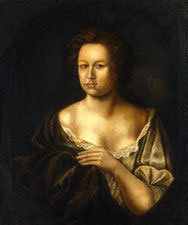Just back from reading the course blogs, and it seems clear that we are going to have an interesting discussion tomorrow!
Some concerns that emerge from the blogs:
• the role of projection in readings of this play: projections of what "ought" to happen, of what Behn's role ought to be. And the possible projections of the critics. (A good example of this latter: more than one critic has noted that Behn shares the same initials as Angelica Bianca, and has argued that the character is perhaps to some extent an avatar, or in some way representative of Behn and her attitudes. And yet as we have read, Behn inherited the name from Killigrew's
Thomaso. A blatant example of careless scholarship, perhaps? But to play the devil's advocate: Behn changed most of the other characters' names, but kept Angelica's. So while the initials were a coincidence, perhaps the keeping of them was not.)
• to what extent is Behn complicit with the sexual violence she depicts? can we interpret this play as in any way subversive? (and how can we define "subversive" in a 17thc context?)
• the relationship between her attitude towards women's issues and her Royalist politics
• Behn's representation/critique/enforcement? of the "virgin/whore" dichotomy
Other points to consider:
• while some of you allude to social constraints on women, we also need to look at the constraints on Behn as a playwright, and as a
woman playwright
• we need to consider the formal constraints of the genre of the Restoration comedy: what was possible, what wasn't. In some ways this was as highly patterned a form as, say, a haiku (okay, some might say a limerick. But the point still holds).
I would also like to discuss the relationship between the two plays:
is Part II just a rehash with an alternate ending? What are we to think of La Nuche and her choices? Is she any sort of a role model? How do we interpret that fact that she "gets the guy"? We need to appreciate how unusual an ending it really is.





